Focusing on mental health has become exceedingly trendy, permeating every corner of society from social media hashtags to corporate wellness programs. This shift is evident in the proliferation of apps designed for mindfulness and therapy, the surge of influencers promoting mental well-being, and the increasing presence of mental health days in workplace policies. Celebrities and public figures openly discussing their mental health struggles further amplify this trend, making it a fashionable topic.
Focusing on mental health has become a lucrative business, with venture capital firms pouring billions into mental health services, apps, and platforms. These investors are capitalizing on the rising awareness and demand for mental health support, seeing it as a prime opportunity to exploit a vulnerable population. Companies like BetterHelp and Talkspace, backed by substantial VC funding, promote their services aggressively, often promising easy solutions to complex issues.
“You Deserve To Be Happy!”
“Its O.K. To Not Be O.K.”
BetterHelp's for-profit therapy ads are omnipresent: TV, radio, podcasts, social media, magazines—you name it. With over $100 million spent on advertising in 2023, BetterHelp is poised to become the top podcast sponsor in the country. Their alluring messages, backed by more than 30,000 therapists available via text, phone, chat, or video at a low cost, promise a shame-free path to growth and wellness. But is this flood of feel-good marketing really the solution to our mental health crisis, or just a slick sales pitch exploiting our collective anxiety?
Spending on mental health services among privately insured Americans surged by 53% from March 2020 to August 2022, despite a plateau in telehealth use, according to a 2023 study by RAND Corporation and Castlight Health. The Fiscal Year 2025 President’s Budget allocates $8.1 billion to the Substance Abuse and Mental Health Services Administration, $612 million more than FY 2023, to support the President’s Unity Agenda. Additionally, in February 2023, the U.S. Department of Education awarded over $188 million to 170 grantees to enhance school-based mental health services, funded by the Bipartisan Safer Communities Act.
Surely, these experts and government authorities know what they're talking about, don't they? It's imperative that we increase our awareness of mental health and take collective action as a society to address this issue.
What Does It Really Mean To Be "Mentally Healthy"?
Do we truly have a universally accepted definition of mental health? Is it merely the absence of painful emotions, a life devoid of anxiety, doubt, loss, sadness, or conflict? Are my emotions too intense, lingering longer than they should? Am I not supposed to think certain thoughts, is that unacceptable? The constant pressure to be happier than I am only adds to the confusion. What is the end goal?
Suddenly, experiencing even mild anxiety for a few days can spiral into a full-blown crisis. "I have anxiety," people now proclaim, as if they’ve been infected with this uncomfortable sensation that urgently needs fixing.
The concept of mental health is deliberately left nebulous, intentionally vague, lacking clear boundaries, which only serves to deepen confusion. This ambiguity inevitably leads individuals to seek validation from professionals to determine the normalcy of their experiences. What ensues is an entire industry poised to validate your struggles and reassure you that you’re on the right path of "taking care of our mental health."
This cycle perpetuates a culture where uncertainty breeds dependency on external affirmation, fostering an environment where the solution to our internal turmoil lies in seeking external validation rather than cultivating genuine understanding and resilience within ourselves.
While it's becoming more acceptable to acknowledge when we're not okay, thereby normalizing the idea of struggle, the underlying message remains unmistakable: action is necessary. And that's precisely the point.
What Does It Mean To “Take Care Of Your Mental Health”?
The phrase "taking care of your mental health" has become deeply entrenched in our cultural vocabulary. It's invoked to justify nearly any action that might have previously given pause, or even prompted feelings of guilt. Whether it's calling in sick to work, ending an uncomfortable conversation, creating space in a relationship, or simply prioritizing self-care, this catchphrase has become a catch-all rationale for prioritizing one's emotional well-being.
For the sprawling sick care and mental health industry, it's not just a slogan—it's a call to action, prompting individuals to schedule appointments with doctors or mental health professionals. So what is now the solution to the problem of being “mentally unhealthy?”
Approximately a quarter of U.S. adults report seeking mental health treatment, almost twice as high as it was two decades ago, It's now widely embraced that therapy is a cornerstone of good mental health. Some therapists even liken it to hitting the "gym."
Ridiculous, right? As if there's a magic talking cure?
They claim that exploring our inner thoughts and emotions is akin to exercise, promising restoration and renewal. There's also this notion that talking to a therapist will help you develop "strategies" to "manage your mental health."
What does that even mean? The advice has become so vague and simplistic: deep breathing, mindfulness, seeking social support. If these are the "strategies" being promoted, you can easily find them with a quick Google search.
Then there's the confounding messaging about psychiatric "medication." Pop pills to numb the discomfort? Lessen the pain? It suggests there's something inherently wrong with our brains for producing these painful thoughts and emotions. This has become the cultural narrative.
On one hand, the "expert" is attempting to normalize what you're feeling, while on the other hand, they're suggesting a potent mood and mind-altering drug, implicitly implying that what you're experiencing is far from normal. Too much to handle I suppose.
Even if we don't seek help from a mental health professional, the constant focus on mental health directs our attention inward, prompting an excessive examination of our thoughts and emotions. People are increasingly analyzing why they think or feel a certain way, treating it as a "mental health strategy." This tendency drives individuals to overanalyze and create narratives about their emotional states, perpetuating a cycle of overthinking and heightened self-awareness.
When our government invests in mental health "education" and services, they're funneling funds into initiatives that place even more emphasis on mental well-being. Meanwhile, experts continually advocate for seeking professional help, driving more people toward psychological or psychiatric interventions in cases that might never have warranted such attention in the past.
What if I told you that the majority of messages around achieving mental health were not only counterproductive but were also the driving force behind feeling worse?
The Paradoxical Effect Of Achieving Mental Health
The dramatic rise in people seeking mental health services is largely driven by general anxiety and mood-related concerns. This increase is a direct consequence of a culture that constantly perpetuates fear-based messaging. From sensationalist news headlines to social media amplifying every crisis, we are inundated with information designed to provoke anxiety and fear. This relentless barrage impacts our mood and overall mental state, making us more anxious and fear-driven, and ultimately pushing more individuals to seek professional help for what might otherwise be manageable emotions.
The more we fixate and ruminate on our worries and struggles, the worse we feel. Therapy often perpetuates this process, with many therapists believing that discussing these experiences is inherently healthy. They are wrong. This approach can create a harmful cycle of excessive rumination, exacerbating the very issues it aims to resolve. We are ultimately creators of our reality, and where we direct our attention is critical. By continually focusing on our problems, therapy can sometimes produce negative outcomes, a reality that is rarely acknowledged in the mental health industry.
Most people assume that mental health education programs are at worst harmless and potentially beneficial. However, in a recent study published in the journal Behavior Research and Therapy (read here), researchers examined the experiences of 1,071 Australian teenagers over the span of 2017 to 2018. The participants were divided into two groups: one engaged in the WISE Teens mental health program, while the other followed a standard health-class curriculum.
Surprisingly, the findings revealed that compared to those receiving standard education, students in WISE Teens reported higher levels of depression, increased anxiety, greater difficulty managing their emotions, and strained relationships with their parents. Astonishingly, one out of every eight participants in WISE Teens showed signs of clinical depression post-program, as opposed to one out of every 13 participants in the regular health classes.
When introducing concepts around mental health problems kids are prone to speaking about normal life struggles in terms of symptoms and diagnoses. This approach instills a sense of pathology or abnormality in children's everyday struggles, potentially leading to heightened anxiety or self-stigmatization. They also are now thinking MORE about their own thoughts, emotions and struggles. This breeds an unhealthy self focus.
How Do “Mentally Healthy” Cope?
Research should shift its focus towards individuals who are thriving, resilient, and have overcome significant challenges and traumatic experiences. We need to study those who embody love, peace, and purpose-driven lives. Instead of perpetuating a culture of victimization and disability, there should be a collective language of resilience and strength. The prevailing messages about fragility only serve to provoke fear and drive people towards constant worry and hyper-vigilance. Which of course drives more suffering and utilization of mental health services.
What have I learned from the wisest and most “mentally healthy” individuals?
Emotional struggles aren't seen as signs of illness, but rather powerful signals that something demands our attention. Seeking therapy isn't the immediate fix because there is not great concern about how they are feeling; it's about recognizing the necessary changes they need to make in response.
Instead of fixating on “mental health”, they tend to fully accept the emotional consequences of their experiences. Taking care of their “mental health” isn't even a consideration; it's just life, with all its challenges. Rather than the primary goal of feeling better, they embrace even the dark times as an opportunity for growth and transformation. Life is hard, but within the struggles lie profound lessons and the potential for profound personal evolution.
Can you even imagine that the dark times of our lives and the fear we experience can actually lead to a more rich and fulfilling life? This idea is rarely discussed anymore, and certainly, these messages are not communicated to our youth.
The default network for human beings is resilience. As educators and mental health professionals, it's crucial that we don't obstruct people's natural coping strategies. Forcing adults or kids to talk about their struggles as if it's the only path to mental health undermines what comes naturally. Sometimes, the most effective thing a teen can do for their mental health is focus on math class or go to soccer practice. They might choose to speak with a friend when the time is right. Adults who cultivate mental wellness focus on living in the present moment, directing their attention outward. They serve others, create, connect with nature, nurture relationships, take care of their bodies, and engage in lifelong learning.
What makes life worth living? These are essential questions that should inspire action towards behaviors that bring fulfillment and meaning. Is therapy akin to preventative medicine, like going to the gym for physical health? No. Going to the gym itself is a form of taking care of your mental health and, for most people, a more effective "mental health" strategy.
We've cultivated a collective cultural consciousness around the notion of "mental health," but ironically, our narcissistic self-focus has led to increased emptiness and mental health issues. I've yet to encounter anyone genuinely happy solely from focusing on themselves. Constant worrying, ruminating, and dwelling on the past—it's all a trap. Instead of finding fulfillment, this inward fixation only deepens our sense of discontent and perpetuates a cycle of emotional turmoil.
It's alarming that 25% of people are currently receiving mental health services—it's way too high. Too many individuals are turning to psychiatric drugs and spending their time and money on therapy. Meanwhile, those who urgently need help are often overlooked. Instead, we're seeing a surge of "talk therapists" who are more interested in providing validation than cultivating resilience and genuine growth. Many of these therapists reflect our society's self-obsession and materialism, perpetuating a culture where superficial happiness is prioritized over true well-being.
The surge in mental health therapists seems ill-equipped to handle the deeper mental health issues affecting a smaller portion of our population. Instead, they are catering to individuals who may never have needed such assistance in the past, potentially obstructing their natural coping processes.
They are products of a woke education system and their pop culture version of being human reflects our collective self obsession and materialism.
"You deserve to be happy!”
Do we truly believe that we have a fundamental right to be "happy"? Is constant happiness the expected state of human experience? The idea that "you deserve it" is nonsense being perpetuated.
If you're not happy most of the time, does that mean you're defective? These are more lies sold to us so we'll buy their product—in this case, therapy or a drug. The reality is, most aim for a state of more consistent calm and focus, with the capacity to feel joy when those moments arise. Emotions are akin to the weather, constantly changing. They all serve a purpose and we have the inborn capacity to use all of them to our advantage if we shift focus away from victimization culture.
We must keep these ideologues out of our school systems and shield the younger generation from their harmful messaging. It's become abundantly clear: "taking care of our mental health" means steering clear of those who insist on obsessing over it.
RESIST






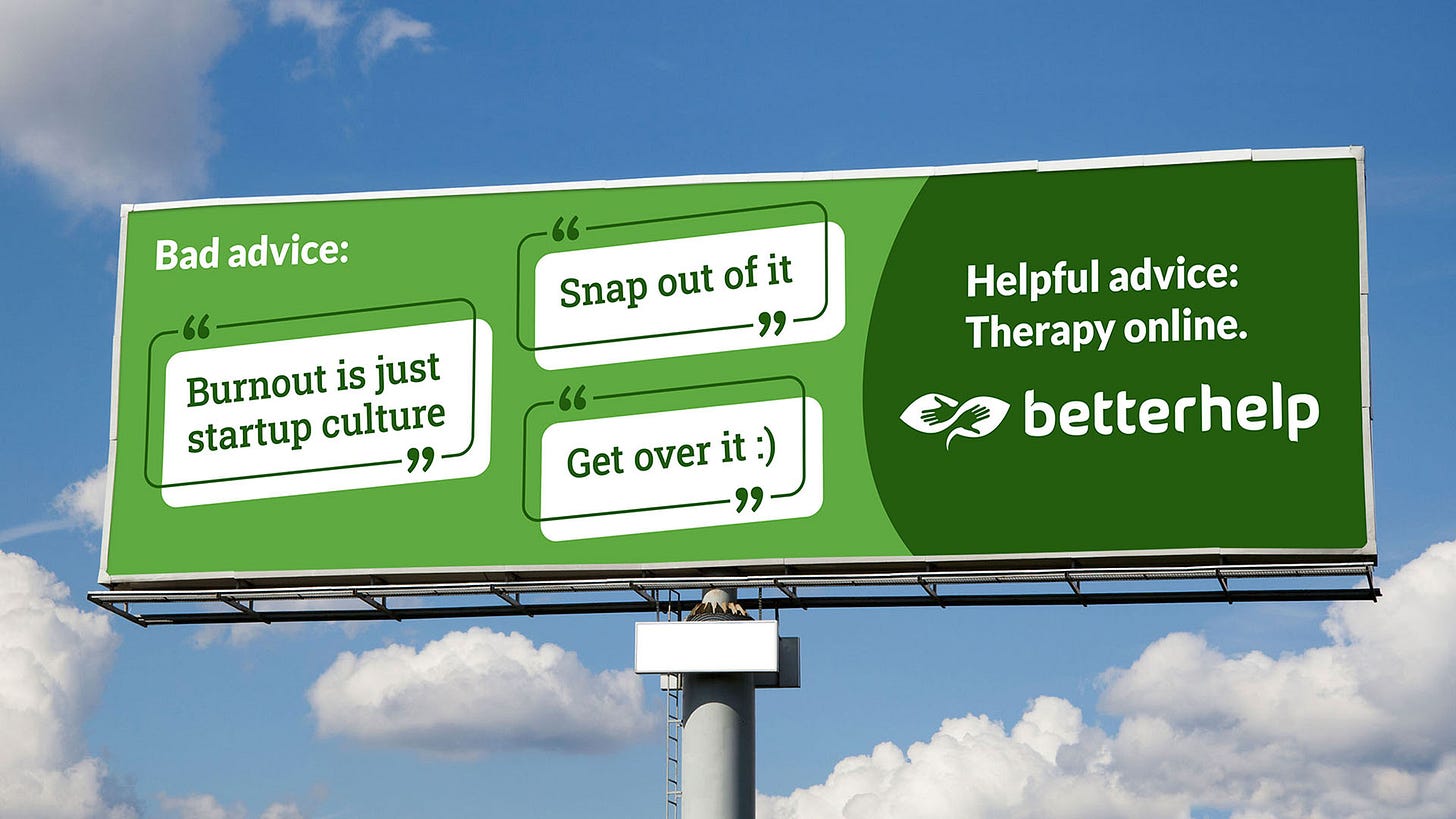
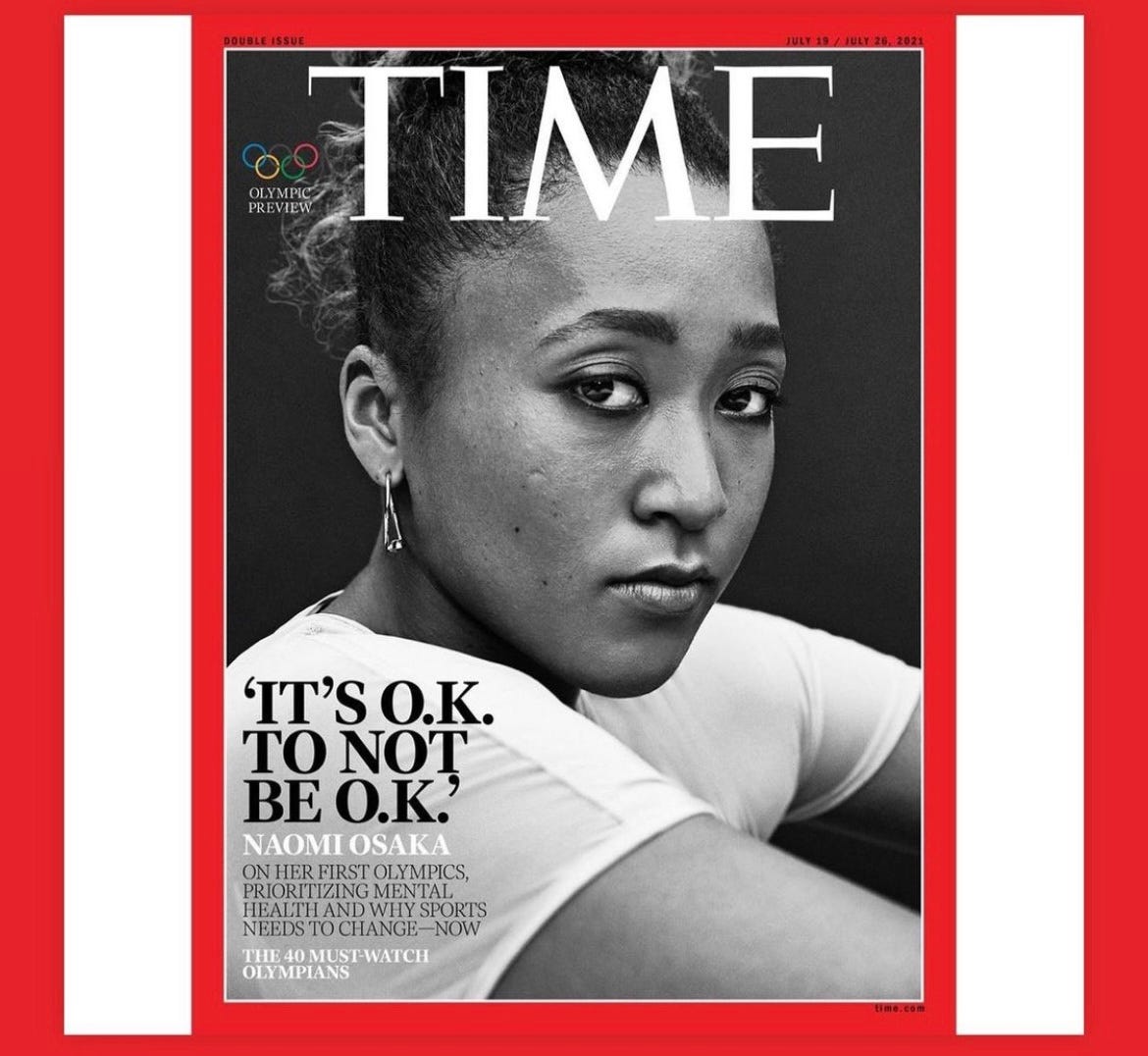
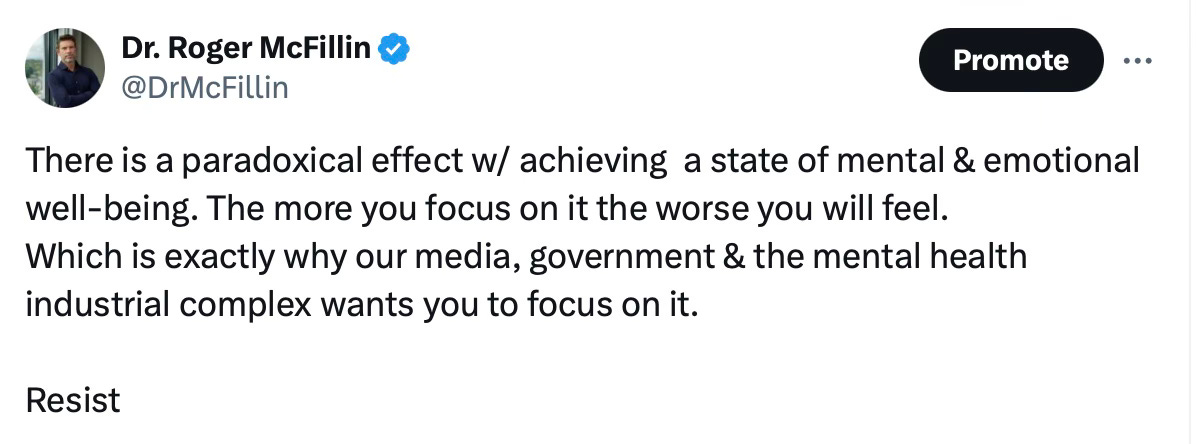
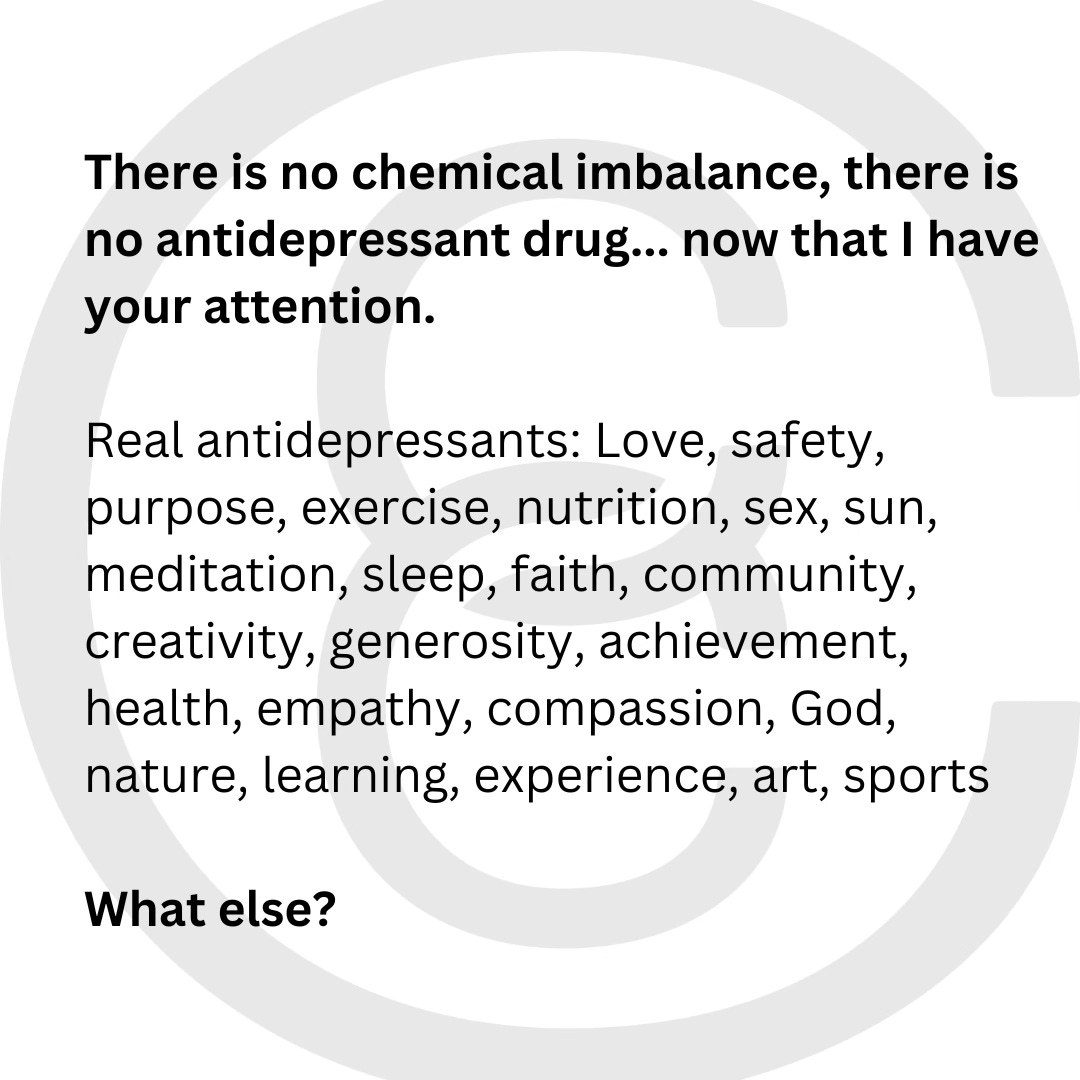
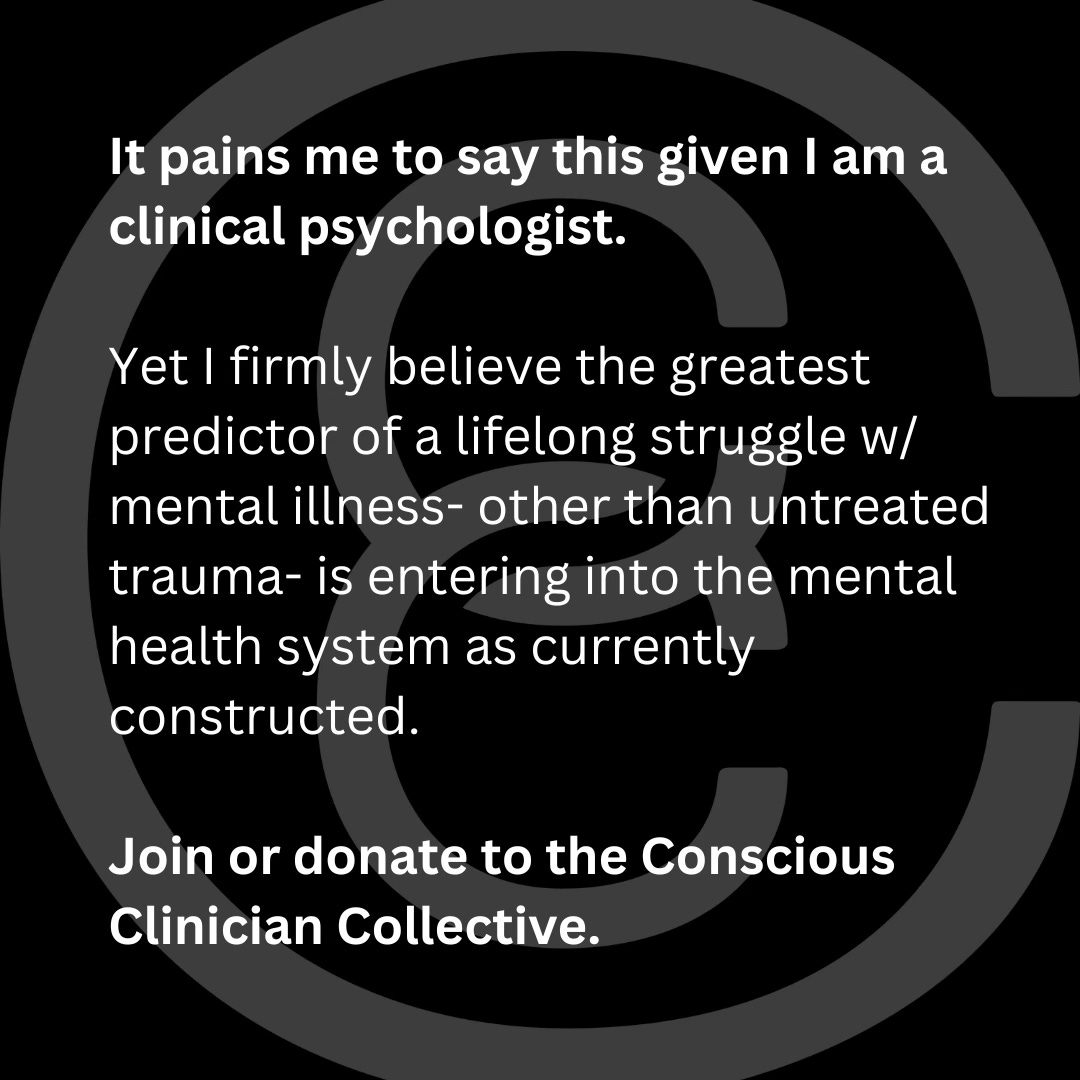
This is the most positive and sensible thing I've read on mental health in years. Thank you, Dr. McFillin. Due to your work, I've encouraged my daughter to wean herself from her anti-anxiety medication. She has found someone she cares about, and that love--looking outward instead of obsessing on her own mental state--has made a world of difference in her level of anxiety, much more than any Big Pharma drugs have accomplished. Thank you so much for your wisdom!
I appreciate your comprehensive dive into the broken mental health care system. When I think of youth and mental illness, I have noticed one consistent factor in their reduction of depression. That is productivity. I've seen young adults get a job with increasing responsibilities and suddenly they're not obsessing about themselves. Also, taking up a sport like running, hiking, or walking can make a huge difference. Again, thank you for your enlightening contribution to this growing crisis.